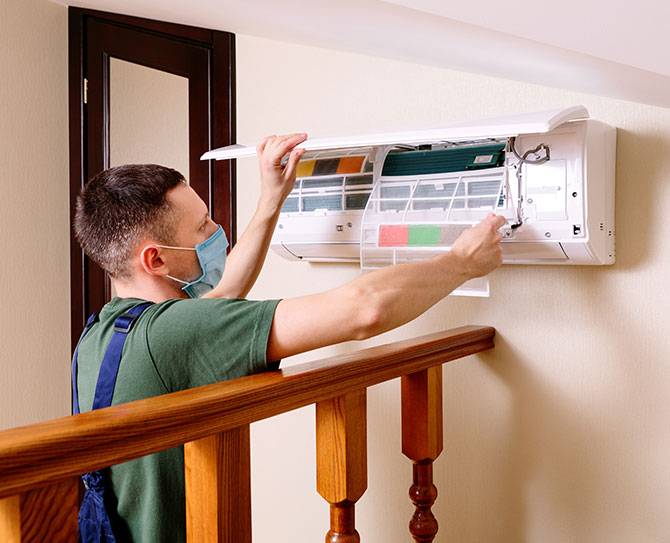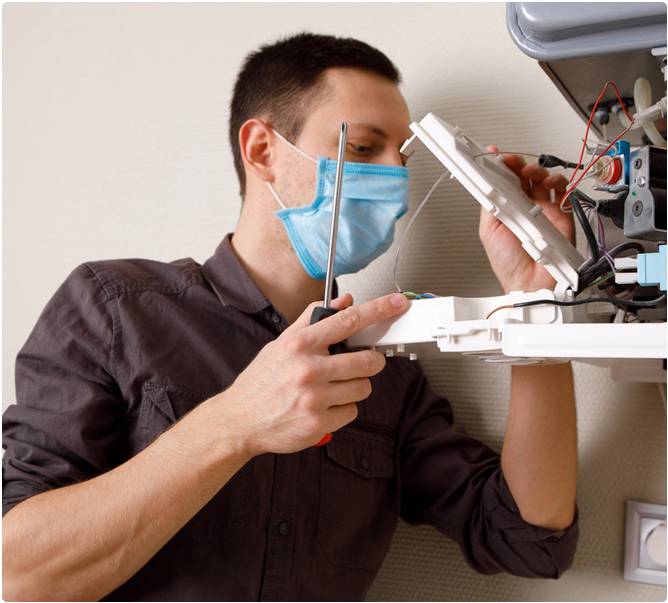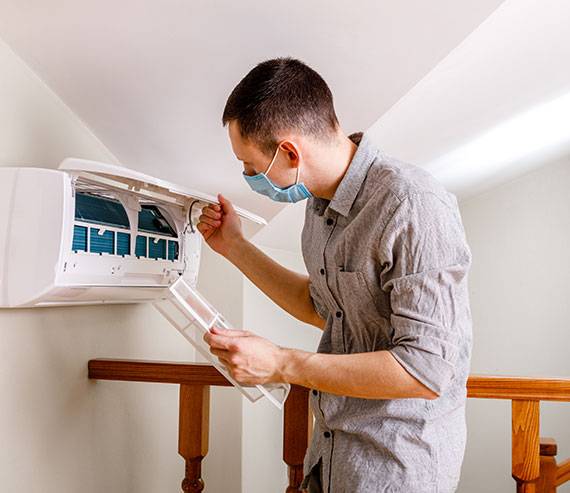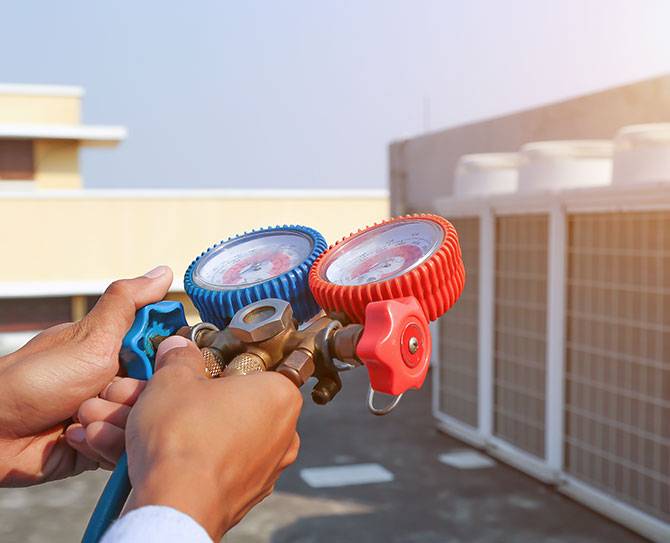10 Reasons Why Your Air Conditioner is Dripping Water
While it’s common for AC units to produce condensation, excessive dripping can indicate potential issues that need attention.
Understanding the reasons behind aircon water leaks is essential for maintaining the efficiency and longevity of your cooling system.
In this guide, we’ll explore the common causes of aircon water leaks and provide tips on how to troubleshoot and resolve them.
let’s jump right in,
Common Cause of Aircon Water Leaks
1. Clogged or Dirty Air Filters: Air filters play a crucial role in trapping dust, dirt, and other particles from the air before it enters your AC system. Over time, these filters can become clogged with debris, restricting airflow to the evaporator coil. When airflow is restricted, the evaporator coil can become too cold, causing moisture in the air to freeze on the coil’s surface. As the coil thaws, the excess water drips into the drain pan below. If the drain pan overflows or the condensate drain line is blocked, water may leak from the unit. Regularly cleaning or replacing air filters can help prevent this issue.
2. Frozen Evaporator Coil: A frozen evaporator coil is often a symptom of an underlying issue such as restricted airflow or low refrigerant levels. When airflow over the evaporator coil is insufficient, the coil can become too cold, causing moisture in the air to freeze on its surface. This can occur if air filters are dirty, if there are blockages in the ductwork, or if the blower fan is malfunctioning. Similarly, low refrigerant levels can cause the evaporator coil to operate at temperatures below freezing. Proper maintenance, including cleaning the coil and checking refrigerant levels, can help prevent freezing and subsequent water leakage.
3. Blocked Condensate Drain Line: The condensate drain line is responsible for removing water that collects in the drain pan beneath the evaporator coil. Over time, algae, mold, and other debris can accumulate in the drain line, causing it to become blocked. When the drain line is blocked, water backs up in the drain pan and may overflow, leading to water leakage from the unit. Regularly flushing the condensate drain line with a mixture of bleach and water can help prevent blockages and ensure proper drainage.
4. Improper Installation: Proper installation of your AC unit is essential for ensuring proper drainage and preventing water leakage. If the unit is not installed correctly or is not level, it may not drain properly. For example, if the unit is not sloped downward toward the condensate drain, water may pool inside the unit and potentially leak out. Additionally, if the unit is installed in a location where it is exposed to direct sunlight or where airflow is restricted, it may be more prone to freezing and subsequent water leakage.
5. Low Refrigerant Levels: Refrigerant is the substance responsible for absorbing heat from the air inside your home and releasing it outside. When refrigerant levels are low, the evaporator coil may not be able to absorb enough heat to prevent it from freezing. As a result, the coil may freeze, leading to water leakage when it thaws. Low refrigerant levels can be caused by leaks in the refrigerant lines or by improper installation. Regular maintenance, including checking refrigerant levels and repairing any leaks, can help prevent this issue.
6. Damaged or Disconnected Drain Pan: The drain pan beneath the evaporator coil collects condensate and directs it to the condensate drain line. If the drain pan is damaged or not properly installed, water may leak out of the unit instead of being directed to the drain line. For example, if the drain pan is cracked or corroded, water may seep through the cracks and leak onto the floor. Similarly, if the drain pan is not securely attached to the unit, it may become dislodged and allow water to escape. Regular inspection of the drain pan during routine maintenance can help identify and address any issues before they lead to water leakage.
7. Faulty Condensate Pump: Some AC units use a condensate pump to remove water from the drain pan. If the condensate pump malfunctions or fails, water may accumulate in the drain pan and eventually overflow, leading to water leakage. For example, if the pump is clogged with debris or if the float switch is stuck in the “off” position, the pump may not activate when water levels in the drain pan rise. Regular maintenance, including cleaning the pump and testing the float switch, can help prevent this issue.
8. Dirty Evaporator Coil: Dirt, dust, and debris can accumulate on the evaporator coil over time, inhibiting proper heat exchange. When the coil is dirty, it may not be able to absorb enough heat from the air to prevent it from freezing. As a result, the coil may freeze, leading to water leakage when it thaws. Regular cleaning of the evaporator coil during routine maintenance can help prevent this issue. Additionally, using a high-efficiency air filter can help reduce the amount of dirt and debris that accumulates on the coil.
9. Oversized AC Unit: An AC unit that is too large for the space it’s cooling may short-cycle, meaning it turns on and off frequently. Short-cycling can prevent the unit from running long enough to adequately dehumidify the air, leading to excess moisture accumulation and water leakage. For example, if the unit is oversized for a small room, it may cool the room quickly and shut off before it has had a chance to remove enough moisture from the air. Proper sizing of your AC unit based on the size and layout of your home can help prevent this issue.
10. High Humidity Levels: Extremely high humidity levels can overwhelm the AC’s ability to remove moisture from the air. Even if the AC unit is properly sized and functioning correctly, it may struggle to keep up with excessive moisture levels, leading to excess condensation and water leakage. For example, during periods of high humidity, the evaporator coil may become coated with condensation, reducing its ability to absorb heat from the air. This can result in excess water accumulation and leakage from the unit. Using a dehumidifier in conjunction with your AC unit can help reduce indoor humidity levels and prevent this
How To Fix a Leaking Air Conditioner
Fixing a leaking air conditioner depends on the underlying cause of the leak. Here’s a step-by-step guide to troubleshooting and fixing common causes of aircon leaks:
1. Turn Off the AC: Before attempting any repairs, turn off the power to your air conditioner to avoid the risk of electrical shock.
2. Identify the Source of the Leak: Inspect the area around your air conditioner to determine where the water is coming from. Check for water pooling around the unit or dripping from the indoor or outdoor components.
3. Check the Condensate Drain Line: A blocked condensate drain line is a common cause of aircon leaks. Locate the drain line and inspect it for any blockages, such as dirt, debris, or algae buildup. Use a wet/dry vacuum or a pipe cleaner to clear the blockage if necessary.
4. Clean or Replace the Air Filter: A dirty or clogged air filter can restrict airflow, leading to ice buildup on the evaporator coil and subsequent water leakage. Remove the filter and clean it with mild soap and water, or replace it if it’s excessively dirty.
5. Inspect the Evaporator Coil: If the evaporator coil is dirty or frozen, it may not be able to effectively remove moisture from the air, leading to water leakage. Use a soft brush or compressed air to clean the coil, or allow it to thaw if it’s frozen.
6. Check the Condensate Drain Pan: Inspect the drain pan beneath the evaporator coil for cracks, corrosion, or other damage. If the pan is damaged, replace it with a new one to prevent water from leaking out.
7. Test the Condensate Pump: If your air conditioner has a condensate pump, check to see if it’s working properly. Pour water into the pump reservoir to test the float switch and ensure that the pump activates and drains water as expected.
8. Inspect the Refrigerant Levels: Low refrigerant levels can cause the evaporator coil to freeze, leading to water leakage. If you suspect a refrigerant leak, contact a professional HVAC technician to inspect and repair the leak and recharge the refrigerant if necessary.
9. Schedule Professional Maintenance: Regular maintenance by a qualified HVAC technician can help prevent aircon leaks and ensure that your system operates efficiently. Consider scheduling annual maintenance to clean and inspect your air conditioner and address any potential issues before they lead to leaks.
By following these steps and addressing the underlying cause of the leak, you can fix a leaking air conditioner and prevent further water damage to your home. If you’re unable to identify or fix the problem on your own, it’s best to contact a professional HVAC technician for assistance.





Leave a Reply